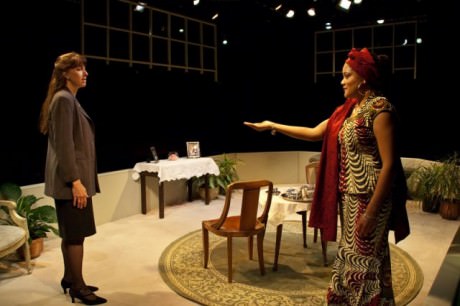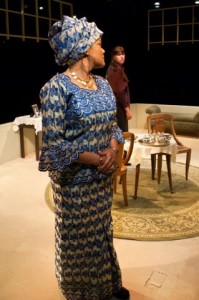If you venture to the Colonial Players‘ production of Going To St. Ives, you will find a compelling and engaging drama that captivates the audience and keeps them on the edge of their seats -desperate to know what happens next. A tale of two mothers comes to light on the stage; their emotional entanglement and struggles as they come to terms with the losses in their lives and their coping mechanisms for their problems. One a world renowned eye surgeon and one the mother of an African dictator – these two women whose paths seem most unlikely to cross, do indeed meet and change one another forever in this harrowing story.

There is a great deal of contrast between the two characters and this is highlighted in the costume designs of Beth Terranova. Cara is outfitted in the complete color spectrum of the British native from drab to non-existent, with a sensible practical approach to the simplicity of the skirts and basic tops. May on the other hand is provided a vibrant array of colors to speak volumes about her African heritage. Her outfits are most regal and becoming of the mother of a God. Terranova provides a bright cream and cornflower blue patterned ensemble for May’s first appearance; letting her cut an impressive figure upon entering the scene. And we are treated to a wild tribal orange dress when we are transported to Africa.

Director Edd Miller crafts perfect stage directions for the two actors. They are constantly in motion, even when sitting still their guided energies shaking the stage with fierce emotions that bring out animalistic qualities. Miller evokes dramatic responses between them; letting the tension build as one who is the predator becomes the prey and vice versa. Doubling as their dialect coach, Miller achieves perfection in the proper English sound of Cara’s character and the heavy African accent of May. A stunning effort coming forth from Miller.
This is the best show of the Colonial Players’ season by far.
When we are first introduced to these characters their tensions are already apparent, though they roil deep beneath the surface, shrouded by small talk and chit chat that is executed with a purpose. May (Lolita-Marie) first appears pious with a sharp tongue, each witty zinger well placed and delivered with a subtle sting intended to evoke a response from Cara (Heather Quinn.) Lolita-Marie uses the metaphors provided in the text to subtly express herself; each word crafted with intention and meaning behind it. She paces frequently, like a caged animal waiting to burst free and attack.
Quinn is exactly the opposite of Lolita-Marie’s first portrayal – sounding astute and very clinical; cold and shut off from the world. She stays stoically still; often grounding her character in a chair sitting perfectly stiff, or standing perfectly straight, as if trying to disappear from sight. Her emotions, at first, are reserved, pushed deep down into the recesses of her character’s heart, as is expected from a proper British woman, but as the show progresses she loses her grip on everything she knows to be true; and as those emotional tensions continue to build; when they finally break through it is like a dam erupting from within Quinn’s soul.
Despite their differences they are two mothers, bound by love and caring concern for their sons. Lolita-Marie is terrifying – dark and intense when she speaks about the crimes her son has committed – when she speaks each word is its own story, breaking from her lips like an unspoken secret, each sentence a new discovery that she experience as the audience does. Her emotions are sharp like a knife when they cut into Quinn – as if her words were claws used to rip open and expose the rawness of Quinn’s feelings. As these characters evolve they grow entangled in one another’s lives; unable to get the other off their mind. Quinn truly explodes into an exposed real human being with thrilling bursts of emotions, engaging her full body to do so in Act II.
Both women become frantic and beyond explosive in act two – their words shattering one another and themselves much like the shattered blue willow teacups. Both Quinn and Lolita-Marie rise to incredible heights to portray a vast range of emotions from these two women – bursts of anger, harrowing confessions, jaw-dropping moments of shock. A perfect performance not to be missed this season.
So if you’re traveling along the road, be sure it is the road that will take you to St. Ives. for an unstoppable emotional drama that will leave you thinking about Cara and May for quite some time.
Going To St. Ives plays through May 19, 2012 at the Colonial Players Theatre – 108 East Street, in Annapolis, MD. For tickets, call the box office at (410) 268-737 or purchase them online.





